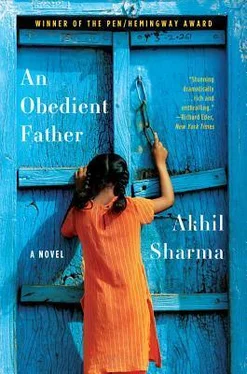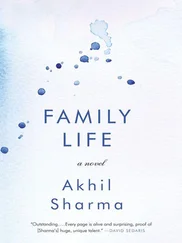Akhil Sharma - An Obedient Father
Здесь есть возможность читать онлайн «Akhil Sharma - An Obedient Father» весь текст электронной книги совершенно бесплатно (целиком полную версию без сокращений). В некоторых случаях можно слушать аудио, скачать через торрент в формате fb2 и присутствует краткое содержание. Год выпуска: 2000, Издательство: W. W. Norton & Company, Жанр: Современная проза, на английском языке. Описание произведения, (предисловие) а так же отзывы посетителей доступны на портале библиотеки ЛибКат.
- Название:An Obedient Father
- Автор:
- Издательство:W. W. Norton & Company
- Жанр:
- Год:2000
- ISBN:нет данных
- Рейтинг книги:4 / 5. Голосов: 1
-
Избранное:Добавить в избранное
- Отзывы:
-
Ваша оценка:
- 80
- 1
- 2
- 3
- 4
- 5
An Obedient Father: краткое содержание, описание и аннотация
Предлагаем к чтению аннотацию, описание, краткое содержание или предисловие (зависит от того, что написал сам автор книги «An Obedient Father»). Если вы не нашли необходимую информацию о книге — напишите в комментариях, мы постараемся отыскать её.
Ram Karan, a corrupt official in New Delhi, lives with his widowed daughter and his little granddaughter. Bumbling, sad, ironic, Ram is also a man corroded by a terrible secret. Taking the reader down into a world of feuding families and politics,
is a work of rare sensibilities that presents a character as formulated, funny, and morally ambiguous as any of Dostoevsky’s antiheroes.
An Obedient Father — читать онлайн бесплатно полную книгу (весь текст) целиком
Ниже представлен текст книги, разбитый по страницам. Система сохранения места последней прочитанной страницы, позволяет с удобством читать онлайн бесплатно книгу «An Obedient Father», без необходимости каждый раз заново искать на чём Вы остановились. Поставьте закладку, и сможете в любой момент перейти на страницу, на которой закончили чтение.
Интервал:
Закладка:
The temple is set at the end of a long, narrow hallway: an open courtyard with a marble floor and walls painted saffron. There is a tulsi bush in the center. Alcoves with statues of God Ram, Hanu-man, and Krishna line the wall. There was no one in the courtyard. I bowed before each of the idols and asked them to take care of Radha's soul and guard Anita and Asha. I tried asking forgiveness from God Ram, but when I attempted to name specific sins, my mind would not form the words. I put a rupee in the collection box and the silliness of this offering made me feel a sudden keen grief for Radha.
After I finished praying, I knocked at a narrow blue door in a corner of the courtyard. After a moment or two, the pundit's wife, a thin seventeen-year-old named Shilpa, unchained the door. Shilpa, like the pundit, was from my village, and I had known her all her life. "Namaste, Ram Karanji," she said.
"Is Punditji in?"
"He's gone to the village. He'll be back tomorrow night, probably"
"Wednesday is the first anniversary of Radha's death and I would like Punditji to pray at my home in the morning," I said. Shilpa didn't answer, and I wondered whether she thought I was neglectful for coming this late to her husband and whether she would gossip about this. "Tomorrow night he'll be back?" I asked. If the pundit turned out to be busy, I would have only Wednesday morning to find a priest.
Shilpa stared at me and then, half smiling, said, "An ice-cream factory is starting in Beri and he's gone to pray for it." As she spoke, her smile opened fully. It was as though she was bragging that the
pundit had moved up from blessing new scooters and new rooms in houses to blessing whole factories.
"I'd like him to pray at my house Wednesday morning."
"I'll tell him."
As I walked to our alley, I considered hiring some other pundit to pray for Radha, but Radha had believed that the prayers of a pundit who did not know the person on whose behalf he was appealing were ineffective. The idea of letting some stranger pray for her made me sad. Then I felt disgusted with my sentimentality. When she was alive, I visited prostitutes two or three times a month. It was only the trauma of the heart attack and Radha's slow death from cancer that had sapped my desire for sex.
Going up our alley, I held the badminton rackets upright in one hand like a bouquet of flowers. I passed the flour mill with its roar and smell of grain burning. I passed the booth of the watch repairman, who was asleep on his stool, his head resting on the plank where he performs the repairs. Entering the dark archway that leads into our compound, I thought that all these details were part of Asha's life as well as mine, and this gave everything a purpose.
A sha squinted when she opened the door. "I woke you?" I
/XKasked, stepping into Asha and Anita's bedroom. The bed-sheet was wrinkled on one side. She could have been home only an hour.
"What do you have?" Asha said, closing the door to keep out the heat. The only light now came through the living room.
"For you," I said, giving Asha the rackets and shuttlecocks.
"Thank you. Thank you," Asha said in Urdu as she took the gift. Asha's choice of switching to a formal language surprised me. It suggested an inner life of which I knew nothing and made me aware that all day I had been imagining her only as a witness.
I sat down on their bed and took off my shoes. Asha stood before me and began swinging a racket.
"Maybe you can play with some of the compound children," I said. Asha laughed and nodded. "Get me some water."
Asha went to the common room carrying a racket in each hand. Anita came into the bedroom doorway. She was wearing her black rectangular eyeglasses, which meant that she had been unable to nap and had been reading the paper in the kitchen. "Couldn't sleep?" I asked as I unbuttoned my shirt. When I reached the top two buttons, my hands trembled.
Anita shook her head no.
"I went to the temple." I paused and tried thinking of a way to hide my mistake of going this late to the pundit. "Punditji's gone to Beri."
"What happens now?" she said with panic in her voice.
"He'll be back tomorrow night."
"He could stay in Beri. People might come and there'd be no pundit." Anita's body had become stiff and the lines on her forehead were sharp and deep. "Think of the shame." Although Anita had most of the responsibility for the ceremony, the strength of her response made it appear affected.
"I can get someone else," I said softly. "Don't worry." It took a moment for Anita's body to loosen. When the lines on her forehead had eased, I said in a light joking voice, "You're like me. Under pressure we stop thinking." Anita didn't reply.
Asha came back with the glass of water. "How was school?" I asked.
"Good."
She looked at me as I drank and I could tell that already our morning conversation and this gift had shifted our relationship. I put the glass on the ground and asked, "Your teachers don't bother you, do they?"
"No. I have good teachers."
"It's bad to hit children." I felt silly for saying something this obvious, so I tried hiding my inanity with more words. "When I was in higher secondary, the untouchables sat in the back of the class.
The teachers couldn't slap the untouchables because then they would be touching them. The untouchables knew this and would always be talking. Sometimes the teachers became very angry, and to shut up the untouchables they threw pieces of chalk at them. And the untouchables, because all the students sat on the floor, would race around on their hands and knees, dodging the chalk."
When I churned my arms to show how swiftly the untouchables crawled, Asha laughed and said, "My teachers only hit with rulers." She was quiet for a moment and then spoke eagerly: "I had something happen. There's a girl in school who last week got one of those soft papers you blow your nose on. Those papers that rich people use instead of handkerchiefs in advertisements. She's been using it all week. She doesn't have a cold, but she keeps putting it in her nose. I told her today the paper was ugly She said, 'If I throw it away, you'll take it.' I said I wouldn't, so she threw it onto the floor and waited. Two girls tried grabbing it. The one who got it blew her nose in it all day"
I laughed at Asha's attention to detail and tried tickling her stomach. Asha jumped away, smiling. "Do you want to come with me to a wedding reception tonight? Since I can't eat much, I should bring someone who can." I said the last sentence because I felt I had to wheedle Anita's permission to do this. The possibility of taking Asha out of the sadness of her life and showing her all the people who knew me had come to me as I left Rosary School with the bag of money
"This is Mr. Gupta's?" Anita asked.
"I can show her off to everybody I know"
"Will there be ice cream and Campa Cola?" Asha said.
"You can just eat ice cream if you want."
Asha giggled at the idea.
"How is Mr. Gupta?" Anita inquired.
Mr. Gupta's son had eloped with a Sikh and this wedding party was coming after many tears and curses. "He keeps wanting to know what he did wrong." Anita sat down on a chair across from me. "I tell him it's all written in the stars."
"It'll be late when you come home. Asha has school tomorrow."
"We'll take an autorickshaw."
Anita looked at Asha beating the air with a badminton racket. Asha was moving from side to side and talking to herself as she played an imaginary opponent. "You can't beat me."
The sun had set forty minutes earlier, and the sidewalks and road were soaked in the same even gray light. I had been so afraid of having nothing to say to Asha that ever since we got in the autorickshaw I had been unable to stop talking. "Mr. Gupta's son had gone with a friend to look at a used car and the man selling it had a daughter who gave them water. Ajay fell in love immediately," I shouted over the beating of the engine. The boy driving the three-wheeler ground gears as he sought the narrow channels of movement which kept appearing and disappearing in the traffic. "I've never seen her, but Sikh women are either very beautiful or very ugly" Asha was looking out of the autorickshaw and I wanted her to listen to me. "I actually predicted this. Long ago, when he was about to go off to college, I read his horoscope and predicted it. And then one day Mr. Gupta comes crying to me: 'Oh, Mr. Karan! I have gone bankrupt.' " Asha held her folded hands between her legs and stared at the traffic. She appeared stunned to have left the flat and to be on the way to a party. Asha wore olive shorts and a white shirt. I saw again how small her kneecaps were. I wore a blue shirt that stretched so tight across my stomach that the spaces between the buttons were puckered open like small hungry mouths. I was using cologne and wondered if Asha had noticed. "I told him, 'What use is it to cry. Pretend everything happened with your permission and that way your nose won't be cut off before everyone. People always say bad things anyway' " As I spoke, I actually began feeling as though I were Mr. Gupta's friend. We passed through the Old Vegetable Market. The vendors were lighting the kerosene lamps, which look like iron-stemmed tulips. "I am only a junior officer," I said, "but Mr. Gupta always turns to me for advice. I spend as much time in his room as I do
Читать дальшеИнтервал:
Закладка:
Похожие книги на «An Obedient Father»
Представляем Вашему вниманию похожие книги на «An Obedient Father» списком для выбора. Мы отобрали схожую по названию и смыслу литературу в надежде предоставить читателям больше вариантов отыскать новые, интересные, ещё непрочитанные произведения.
Обсуждение, отзывы о книге «An Obedient Father» и просто собственные мнения читателей. Оставьте ваши комментарии, напишите, что Вы думаете о произведении, его смысле или главных героях. Укажите что конкретно понравилось, а что нет, и почему Вы так считаете.












